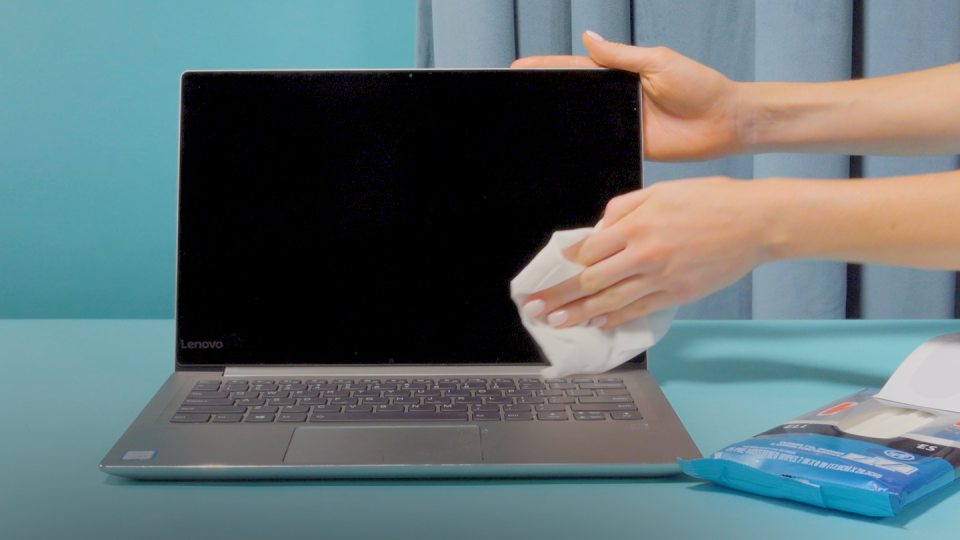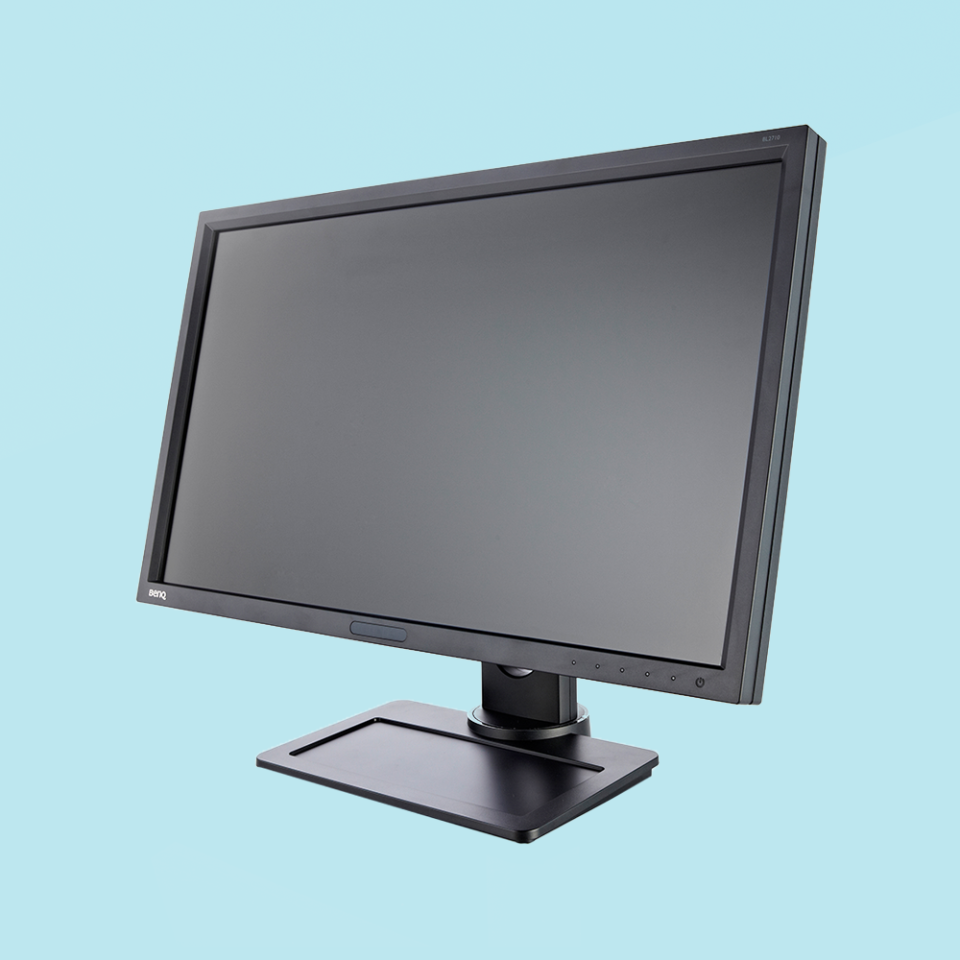The Way You're Cleaning Your Computer Screen Could Be Damaging It
"Hearst Magazines and Yahoo may earn commission or revenue on some items through these links."
Whether it's the monitor in your cubicle at work or a laptop on the standing desk in your home office, computer screens get grimy. Getting rid of dust is a major concern: As it silently and continuously builds up, it may distort the color or brightness of your screen. Greasy fingerprints are another offender. Even if you don't have a touchscreen model, fingerprints happen and become especially visible when the screen is black. Finally, germs are always an issue — it's just good practice to keep frequently used surfaces sanitary.
Cleaning a screen requires a delicate touch. Some cleaners or cloths are too abrasive. Using the wrong liquid can cause damage, and using too much liquid can cause your laptop or monitor to short out altogether. To find out what cleaning products and supplies are safest to use, we checked in with Carolyn Forté, the Executive Director of the Good Housekeeping Institute Cleaning Lab.
Forté says, "If there's one thing you should avoid entirely, it's regular glass cleaner that you'd find in the cleaning aisle. Windows are different surfaces from computer screens and with different cleaning needs." She explains that using a clean, dry microfiber cloth is the best and safest way to remove streaks or smudges and that just plain wiping also removes bacteria. But to actually disinfect, you'll need a cleaning product.
A note on the various degrees of cleaning: Some products may only clean or sanitize a screen, which the CDC defines as "[lowering] the number of germs on surfaces or objects to a safe level," based on how they work, the ingredients they contain and the length of time they remain on the surface. Others disinfect, which actually "kills germs on surfaces or objects" and "further lowers the risk of spreading infection" overall. Disinfecting takes longer than cleaning or sanitizing.
What is the best thing to clean a laptop screen with?
The answer is complicated, as there are hundreds of laptop manufacturers and even more when it comes to monitors — and they all have their own safe cleaning recommendations. Always start by following your computer manufacturer's cleaning advice, especially if your device is still under warranty. If that doesn't totally take care of the problem, there may be other steps you can take depending on the type of screen you have, but proceed carefully.
What is safe for your laptop screen usually comes down to whether or not it has a glass covering. For Macs, this is usually the case. But PC models may not have glass over their LCD screens. When in doubt, refer to your user's manual, or reach out to your laptop's manufacturer online via email or on-site support chats to learn more.

That being said, Forté says most Apple laptops and monitors — or any laptop with a glass-protected screen — can be wiped down with either Lysol or Clorox disinfecting wipes. Since laptops are routinely handled, Forté says even if you disinfect your device, it won't stay disinfected for long. If you still want to give disinfecting a go, surfaces cleaned with traditional disinfecting wipes usually need to remain wet for four minutes to kill viruses and bacteria, but check the label of the wipes you are using to be sure. Then, let your screen air dry and buff again with a microfiber cloth.
Remember: For any device, you never want to spray a cleaning agent directly onto the screen — it could seep into the cracks and crevices of your laptop, Forté says. "You want to make sure that no excess water, cleaner or liquid gets inside your laptop," she explains. "Always spray onto a cloth first if you are trying to use aerosols or sprays, and make sure any wipes you use are not overly wet."
How to clean and disinfect a non-LCD (glass-covered) laptop screen:
Unplug your laptop from its power source, and turn it off (do the same for monitors).
Use a clean microfiber cloth to wipe down your screen, removing dust, smudges and any other surface fingerprints.
Wring out a disinfecting wipe to ensure it's not oversaturated and gently wipe your laptop's screen horizontally and vertically making sure it stays wet for the time required by the package instructions and taking care to not touch any openings (including ports or speakers).
Let your screen air dry. If streaks remain, wipe it down once more with a clean microfiber cloth.
How to clean an LCD (not glass-covered) laptop screen:
If you have a PC laptop with an LCD screen, you should not use disinfecting wipes. Manufacturers, such as Hewlett-Packard, say that active ingredients found in both Clorox and Lysol wipes could damage your screen. This HP customer support web page also cautions: "Do not use any of the following chemicals or any solutions that contain them: Acetone, ethyl alcohol, toluene, ethyl acid, ammonia or methyl chloride." It also states that "some commercial glass cleaners contain ammonia and are therefore unacceptable." It's best and safest to wipe them with a dry cloth or for stubborn spots, use an LCD-safe cleaner sparingly applied first to the cloth and then to the screen. Never spray the screen directly.

Microfiber cloths are made with special fibers that have more surface area to trap dirt, grime and germs, Forté says, and with edges to lift bacteria off your screen. While a dry microfiber cloth can't disinfect an LCD screen, using one to wipe down your screen won't put it in danger of the permanent damage that cleaners could pose and can remove some germs.
Additional recommendations on HP's support page read, "To clean smudges from the LCD screen, choose a nonabrasive cloth or towel. Turn off the computer and disconnect the power cable. Wipe the screen gently with a soft, dry cloth. If any marks remain, moisten the cloth with LCD cleaner, and then gently stroke the cloth across the display in one direction, moving from the top of the display to the bottom."
Can I use water and soap to clean my laptop screen?
Forté confirms that you should not use soap and water to clean any computer screen. Some soap varieties may contain ingredients known to affect LCD screens and a sudsy mix is not only too wet, but won't evaporate quickly enough to safely be used on a laptop screen.
Should I clean my keyboard in the same way?
Since your keyboard is the part of your laptop you're touching most, you might be wondering if you should use disinfectants on this surface as well. Apple's cleaning recommendations page indicates that 70% isopropyl alcohol wipes or Clorox Disinfecting Wipes can be used to gently wipe the hard, non-porous surfaces of Apple products, like displays, keyboards and exterior surfaces. PC laptop manufacturers all have various instructions (HP says cleaning the keycaps with dish soap is fine).
Forté says you shouldn't be afraid to wipe down your keyboard with a wipe after you've taken time to clean your laptop's screen. Despite official recommendations, keyboards are made with plastic keys that are non-porous, and Forté explains that they shouldn't be affected, especially if you're careful in ensuring excess liquid isn't seeping between and beneath the keys. Just like when you clean your screen, you'll want to make sure your computer is off.

Both Forté and Apple recommend holding your laptop at a 75° angle and using a can of compressed air to blow away debris that's become lodged between keys before wiping it down. Lastly, you can also dip a clean microfiber cloth or a large cotton swab into rubbing alcohol and go over each of the keys to clean and sanitize them.
The bottom line: It's clear that laptop manufacturers have various recommendations when it comes to cleaning so be sure to follow their guidelines first. While disinfectants may contain solvents or other cleaning agents potentially damaging to some surfaces, they're formulated to actually kill germs. Regular screen cleaners or microfiber cloths don't have the same killing power as disinfectants, but are viable cleaning alternatives if you're concerned about the safety of your computer screen.
You Might Also Like

